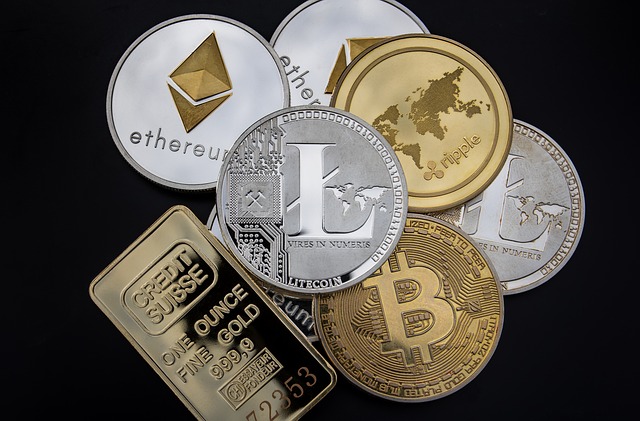3 mythes over cryptocurrency
Laatste update: 27 maart 2022
Cryptocurrency is een erg polariserend onderwerp.
Sommige mensen zweren erbij, en denken dat crypto het betaalmiddel van de toekomst zal worden.
Het is immers een prima alternatief voor het onbeperkt printbare fiatgeld dat onze huidige economie ondersteunt (met torenhoge schulden en inflatie tot gevolgd).
Andere mensen denken dan weer dat crypto waardeloos is (of uiteindelijk zal zijn).
Omdat er rond crypto nog zo veel onduidelijkheid hangt, zijn er een aantal mythes over cryptocurrency die (vooral bij beginners) hardnekkig blijven bestaan.
Wat zal de toekomst van crypto zijn? Niemand die het met zekerheid weet, en in dit artikel probeer ik alvast enkele mythes over cryptocurrency te ontkrachten.
Ik ben zelf geen expert in crypto, dus als je hier meer over wil leren, kan ik je het boek The Internet of Money aanraden, van crypto expert Andreas M. Antonopoulos.
Mythe #1: Cryptocurrency is een voorbijgaande trend
Crypto is zeker nog een nieuwe speler op de markt. Bitcoin, de eerste en meest bekende cryptomunt, is ontstaan rond 2009 en begon pas rond 2013 globaal bekend te worden. Dat is minder dan 10 jaar geleden!
Natuurlijk is het dan logisch dat mensen denken dat het slechts een trend is, dat Bitcoin, Ethereum, Dogecoin en companie het niet lang zullen uithouden en dra van het toneel zullen verdwijnen.
Maar wat mensen die dergelijke mening aanhangen vaak niet goed beseffen is dat cryptocurrency slechts één van de vele toepassingen is van de blockchain.
Ik heb dit onderwerp reeds in meer detail besproken Wat is de blockchain?, maar kort samengevat kan ik stellen dat deze technologie revolutionair is, en de mogelijkheid heeft om een even grote impact te hebben op de technologische vooruitgang van de mensheid als het internet indertijd heeft gehad.
En cryptocurrency hangt hier zonder twijfel aan vast. Hoewel het zeker mogelijk is dat het belang van cryptocurrency zal afnemen, in tegenstelling tot sterk toenemen zoals ik denk, maar volledig zal dit wellicht nooit meer verdwijnen.
Kortom, van deze mythe is niets aan.
Mythe #2: Cryptocurrency is onveilig
Omdat cryptocurrency geen achterliggende waarde heeft, en omdat het volledig digitaal is, is dit natuurlijk een ideaal doelwit voor hackers.
En het klopt zeker dat er in het verleden al een heleboel hacks zijn gebeurd, en dat cryptocurrency werd gestolen van allerlei platformen.
Maar dat ligt aan de veiligheid van die platformen zelf, niet aan de cryptocurrency.
Crypto is immers ontworpen om “onhackbaar” te zijn.
Elke transactie wordt vastgelegd in de blockchain, en dus is het onmogelijk om gewoon cryptomunten te verdubbelen of te vervalsen.
Als je het goed aanpakt en veilige hardware crypto wallets aanschaft, zijn jouw cryptomunten vele malen veiliger dan andere vormen van geld.
Niemand kan aan jouw cryptomunten, tenzij ze beschikking krijgen over jouw specifieke sleutels.
Je moet natuurlijk die sleutels goed bewaren, maar het is een geruststelling dat deze niet gehackt kunnen worden.
En ook betalingen met cryptocurrency zijn volledig veilig, omdat niemand je cryptomunten kan onderscheppen.
Mythe #3: Cryptocurrency is waardeloos
Cryptomunten zijn gebaseerd op “niets”. Ze worden volledig digitaal gemaakt en gebruikt, en worden niet gedekt door een vaste waarde zoals goud.
Dus op dat vlak klopt het wel dat crypto an sich waardeloos is, maar je kunt hetzelfde zeggen over de euro.
Het papiergeld waarmee jij betaalt is ook waardeloos. Er staat geen goud achter, alleen maar de algemeen aanvaarde consensus dat dit biljet of deze metalen schijf een bepaalde waarde heeft.
Zodra cryptocurrency meer en meer gebruikt begint te worden, zal de waarde ook toenemen.
Als 2 gebruikers overeenkomen dat crypto waarde heeft, en dat de ene ermee zal betalen voor een dienst of product van de andere, dan is er toch geen enkel probleem?
Het wordt (nog) niet gedekt door alle overheden, dat klopt (met El Salvador als uitzondering), maar volgens veel experts zal dit wel veranderen.
En in het geval van Bitcoin zijn de cryptomunten ook nog eens een eindig goed, waardoor er schaarste en inherente waarde aan wordt gehecht.
Kortom, hoewel cryptocurrency op zich inderdaad “waardeloos” is, bepaalt de markt wat de waarde is, en als genoeg gebruikers crypto waardevol vinden, dan is het waardevol.
Wil je zelf ook investeren in crypto, dan kan je dat doen via Binance, en krijg je zelfs wat cashback.


